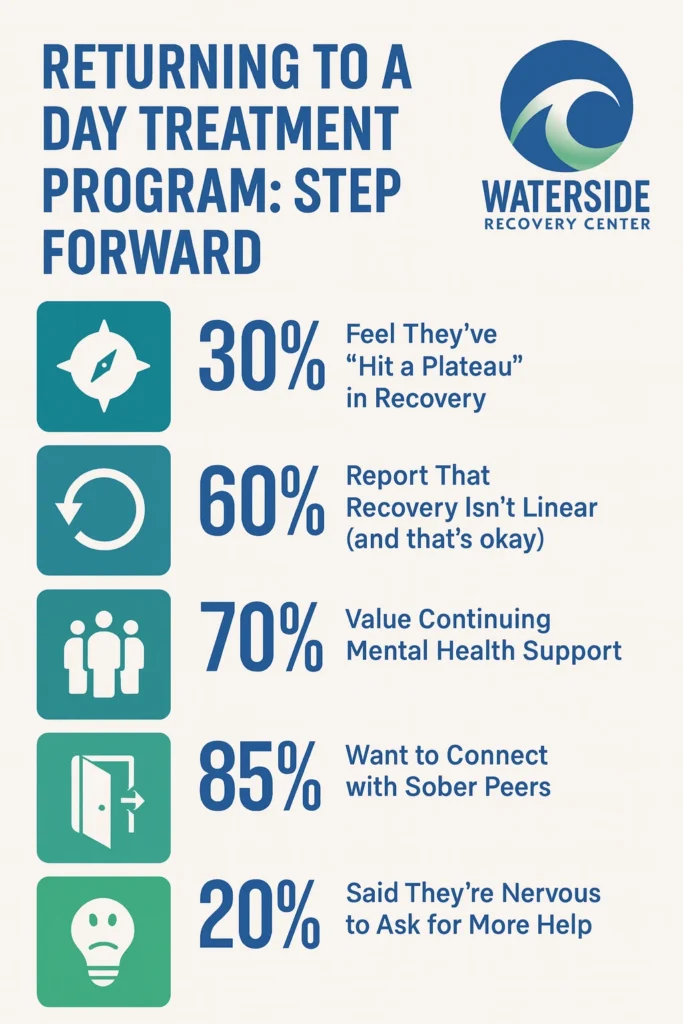Even after months—or years—of sobriety, it’s possible to feel stuck. Not because you’ve done something wrong, but because something’s shifted. Your routine may feel hollow. Your emotional highs and lows have leveled off into a muted middle. The milestones are behind you, but the meaning feels farther away than ever.
If that sounds familiar, you’re not broken. You’re also not alone.
And no—you haven’t lost your progress.
But you might be ready for something more.
Revisiting a Day Treatment Program isn’t about “starting over.” It’s about reconnecting to your growth in a deeper, more intentional way—especially if your sobriety has started to feel more like maintenance than movement.
Feeling Stuck Doesn’t Mean You’ve Slipped
In early recovery, everything felt urgent. Emotional breakthroughs, life changes, daily decisions—they came fast and hard. But after the dust settles, long-term recovery can start to feel… quiet. Flat. Even numb.
It’s not a failure. It’s a signal.
That emotional distance you’re feeling? It’s not regression. It’s your mind and body asking for something deeper than just staying sober. It’s asking for connection, renewal, and perhaps, structured support to process the now of who you are—not who you were when you first got clean.
Progress Isn’t Always a Straight Line—And That’s Okay
You might wonder: “Shouldn’t I be past this by now?”
But here’s the truth: recovery isn’t a one-time event. It’s an evolving process. And sometimes, that process circles back—not because you’ve failed, but because there’s more to uncover.
You’re not a beginner anymore. So your needs aren’t the same as they were at the start. That’s why our Day Treatment Program in Plymouth County, MA is designed with flexibility and depth—to meet you where you are now, with care that fits your experience, not your diagnosis.
What Can You Gain by Returning to a Day Treatment Program?
If you’re already sober, what’s the point of going back to treatment? For many long-term alumni, it’s not about “fixing” something—it’s about reclaiming growth that’s slowed down.
Here’s what re-engaging in a structured day treatment setting can offer:
- Renewed emotional insight: Life keeps happening after treatment. And with that comes grief, stress, relationship changes, burnout. Day treatment gives you space to process those things—not just react to them.
- Deepened self-work: Long-term sobriety invites new layers of healing. Trauma work, identity shifts, and self-worth exploration are all better supported when you’re not doing it alone.
- Stabilizing structure: When routines feel meaningless or isolating, having a therapeutic anchor can bring rhythm and safety back into your week.
- Connection with others who get it: You’re not the only one who feels this way. But the isolation of long-term recovery can make it feel that way. Group work and peer connection help remind you: you’re not weird, you’re human.
- Support without starting over: Our day treatment program honors where you’ve been. You won’t be treated like a beginner—you’ll be engaged like someone ready for the next level of support.
From Survival to Meaning
Early recovery is about survival. But long-term recovery? That’s about meaning. Purpose. Connection.
If you’re feeling disconnected, emotionally tired, or unsure what’s next, that doesn’t mean something is wrong. It means you’re ready to move from maintenance to expansion.
It’s the difference between keeping the lights on… and choosing to decorate the space you live in.

There’s No Shame in Coming Back
You don’t have to prove you’re struggling to deserve support. You don’t have to wait for a relapse, crisis, or emotional breakdown to justify asking for more.
Coming back to treatment—especially when you’re still sober—is one of the most courageous moves you can make. It says:
“I know my health is worth investing in.”
“I’m ready to reconnect with myself.”
“I haven’t lost my progress—but I don’t want to lose myself.”
We’ll meet you there—with open arms, zero judgment, and clinical care that understands the complexity of long-term recovery.
What Alumni Say About Returning
“I didn’t think I was ‘allowed’ to come back since I wasn’t using. But I was emotionally numb. Coming back to Waterside helped me feel again—and remember why I got sober in the first place.”
— Day Treatment Alumni, 2024
“It wasn’t about starting over. It was about continuing the work—just deeper. More honest. Less about survival and more about growth.”
— Former Client, 2023
Serving Plymouth and Bristol County Alumni
If you’re looking for a Day Treatment Program in Plymouth County, MA, Waterside Recovery offers a program uniquely suited for alumni ready to re-engage.
We also support individuals in nearby Bristol County, providing a space for reconnection without judgment or pressure.
Wherever you’re located, the key is this:
You haven’t failed.
You’re simply being honest—with yourself, and your needs.
That’s not weakness. That’s strength.
FAQ: Returning to a Day Treatment Program
Is returning to day treatment only for people who’ve relapsed?
No. Many long-term alumni return for support with mental health, emotional reconnection, or personal growth. Relapse is not a requirement for care.
Will I have to start over with a new treatment plan?
Not at all. Our clinical team will collaborate with you to build a plan that fits where you are now—not where you were when you first entered treatment.
What if I’m not sure what I need—just that I’m tired and disconnected?
That’s a perfectly valid reason to return. You don’t need to have the words or the answers. We’re here to help you explore that, without pressure or judgment.
Can I still work or take care of my family while in day treatment?
Yes. Our program is designed to provide meaningful support while allowing you to maintain daily responsibilities. You’ll have structure without needing to pause your entire life.
How long does the program last for returning clients?
It varies based on your needs. Some alumni stay for a few weeks, others for longer. We’ll build a plan together that respects your time, your goals, and your growth.
Let’s Talk About What You Need—Now
If you’re feeling flat, emotionally distant, or unsure what’s next in your recovery—it’s okay to ask for more. Call us at (866)671-8620 or visit our Day Treatment Program page to learn more about our services for long-term alumni in Plymouth County, MA.


